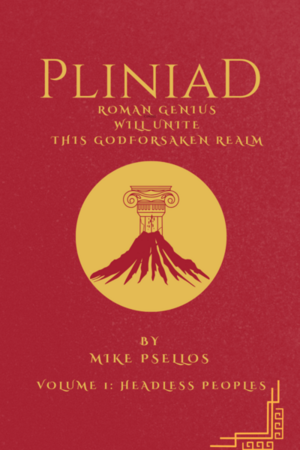Chapter 12:
Suicide Note: I Lamenti's Death Proposition, Shot by a Witch, and World-Pain
The Quietus Cloud, The Witch Curve, and The Five - A mathematical, historical, and philosophical tale set in a world where the sun is about to end and a cloud covers the entire earth in eternal twilight
I Lamenti, Proposition 1.1
Hello, World! Hello, my self Fermi Isai Herzwarn. Hello, everyone.
74 years have passed; I have experienced the ups and downs of life's curve. I have stood, walked, sat, and slept.
The older I get, the more my physical health decreases, like my left knee, Hörsturz, and especially that Hexenschuss. But that's not much, because what gnaws at me more is Weltschmerz.
I have felt Weltschmerz for a long time, but since I attended Soki (祖忌) the last time, I feel that Weltschmerz has increased exponentially in my soul.
Therefore, I make a proposition. The proposition is the January 1st proposition, or Proposition 1.1.
So let me enjoy my own Abschiedssouper, which is enough for just one spoon. Just like Socrates, who swallowed his hemlock, I will finish my portion of hemlock too, "and I have given up the spoon."
In the end, however, death will never be the Apollonius of Perga asymptote of my life's curve; in the end, I will intersect with death.
For 74/nanashi years, I have carried my body, mind, and name. Now I bid farewell to all. Allow me to go to the world that is “soki” (退き), or a world far away; allow me to go to the world called “nanashi,” the anonymous/nameless and unknown world.
Allow me not to witness how the Quietus Cloud disappears. Like the sun, my life will end too. As I have thought and planned, so shall it come to pass.
Such is my life that has been demonstrated; you can still find traces of me in this world on the tombstone [∎].
(***)
When I finished reading what Langfelder thought was the suicide note, I stared at him. I was silent for a few seconds, and when the policeman seemed about to say something, I blurted out, “Tombstone. QED.”
Langfelder asked, “I think Wissenmeister Schonewolken has some words to explain that?”
I explained, “QED is an acronym for the ancient Latin phrase 'quod erat demonstrandum.' In earlier times, the term was used to indicate that a mathematical proof or philosophical argument was complete, with this term written at the end. However, today, many people use the black square sign, also known as end marks or tombstones, alongside QED."
I revealed my knowledge: “As I said earlier, QED was widely used in the past. As a few examples, figures who used the term include Euclid, Archimedes, and Baruch Spinoza. And the name of the first figure I mentioned seems to be related to the four titles of the writings that you suspect are suicide letters.”
“Oh, is that so?” Langfelder asked.
I explained, “Euclid was an ancient mathematician who was the author of a work entitled ‘The Elements.’ In the language of the Republic of Aithalia, the translation of ‘The Elements’ is ‘Gli Elementi.’ While ‘I Lamenti’ are the first two words of the title of this letter.”
Langfelder said, “Ah, Aithalia. As far as I know, the pronunciation of ‘I’ and ‘Gli’ is not much different.”
“That’s right,” I said.
Like the word ‘the,’ 'I,' and ‘Gli' in Aithalia are one form of articles. I and gli are both used to refer to plural words. I is used with masculine words beginning with most consonants, while gli is used with masculine words beginning with a vowel or with z or s plus a consonant.
As two countries that have close diplomatic ties, many citizens of the Federal Republic of Deuschtonia and the Republic of Aithalia interact and visit each other. Because of this, many citizens of the two countries already know the culture and language of their allied country. It is not surprising that Langfelder is one of our citizens who knows a lot about Aithalia.
Langfelder said, “The pronunciation of Gli Elementi and I Lamenti will not be much different. While I Lamenti means The Laments.”
“That’s right,” I said.
The policeman then asked, “Earlier, Wissenmeister Schonewolken said that it seems that Euclid is related to these four-letter titles?”
I explained, “Yes. The Elements by Euclid that I mentioned earlier is a mathematical treatise consisting of 13 books. Books that, of course, contain a lot of material about mathematics, one of which discusses what is called a mathematical proposition.”
“The proposition is usually written in the order of the book volume and then the proposition number. Usually, the volume is written in Roman numerals, followed by a period, and then the proposition is written in regular numbers. For example, Proposition 11 from Book IV of Elements is written as Proposition IV.11.” I gave an example.
Langfelder commented, “But in this letter, the proposition is written in regular numbers, which would make it appear that it is a date. 1 dot 1. January 1, the time of the incident.”
“Correct,” I said.
The formatting in Deutschtonia does use a period separator. Traditionally, we use the little-endian format of two-digit dates, two-digit months, and four-digit years. Our government has enforced the international format of writing four digits for the year, two digits for the month, and two digits for the date as the standard format in certain fields such as engineering, government, textbooks, and science books. But because it is still widely used, the format of two-digit dates, two-digit months, and four-digit years is still officially valid in our country.
Langfelder argued, “So if Wissenmeister Herzwarm had already written 1.1, it means that there was a plan to do this today...”
I refuted and once again stated the same opinion, “Mr. Warm did die today, but I don’t think it was necessarily a suicide.”
Langfelder repeated his institution’s statement, “Yes, yes. We also still haven’t concluded the cause. We will do our best to reveal the truth to the world.”
Then Langfelder returned the conversation to peeling the contents of the text, saying, “Then after the title, followed by the greeting. Wissenmeister Schonewolken, in this greeting, Wissenmeister Herzwarm refers to himself. Is that something that Wissenmeister Herzwarm usually does in everyday life?”
I replied, “No. I have never known Mr. Warm to speak or write in such a style.”
Langfelder simply nodded his head in response to my information. Meanwhile, I gave another piece of information: “In this greeting section, ‘Hello World is an expression that usually appears in simple programs to describe the basic syntax of programming languages. For that, I have seen Mr. Warm do it several times, using programming languages for everyday life. For example, saying ‘init!’ which means initiation to start something, or saying that I am currently ‘fflush-ing,’ and so on.”
Langfelder commented, “Interesting fact.” He then continued the discussion by asking, “Next is about the physical and mental disorders of Wissenmeister Herzwam. Has Wissenmeister Schonewolken ever heard of these complaints?”
I said, “I know Mr. Warm complained of pain in his left knee, felt that he had hearing loss or Hörsturz, and felt that he was shot by a witch.”
Langfelder certainly understood that ‘shot by a witch’ meant lower back pain. Hexenschuss is indeed derived from the combination of two words, namely 'Hexe,' which means 'witch,' and 'schuss,' which means 'shot.'
The term originated because in ancient times, people thought that witches would shoot arrows at the back of our bodies. Some also suspect that the term emerged because if we have back pain, we will often bend over and make ourselves look like old witches with hunched bodies.
Langfelder responded, "I see. Then what about Weltschmerz? Has Wissenmeister Schonewolken ever seen signs of Wissenmeister Herzwarm experiencing Weltschmerz?
I shook my head. "No. Not at all. I think all my colleagues in the Five will also answer that they have never felt that from Mr. Warm. I'm sure so."
Weltschmerz is a term that can be interpreted as 'the pain of the world' or 'world-weariness.' Literally, the term means ‘world-pain.’ Weltschmerz can be defined as a state of exhaustion or heartbreak about life that proceeds from an acute awareness of suffering and evil. This state of mind results from the thought of an individual who believes that reality will never be able to satisfy the expectations of his mind.
Langfelder gave a look that I could translate as, “Yes, Wissenmeister Schonewolken, it seems that Wissenmeister Herzwarm will not experience Weltschmerz.”
But what Langfelder said next was, “Okay, if that is your testimony, Wissenmeister Schonewolken. Now, what about this first Soki word that was mentioned?”
I explained, “I understand what this Soki means. Soki, here is the language of Mr. Warm’s grandmother, whose grandmother came from the country of Zeppenhigen. In this case, soki means a commemoration of the death of the founder of the sect."




Please sign in to leave a comment.